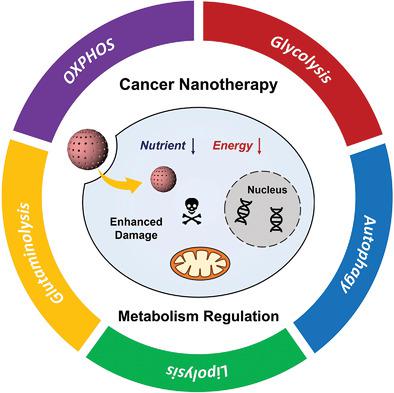Our official English website, www.x-mol.net, welcomes your
feedback! (Note: you will need to create a separate account there.)
癌细胞代谢调节中的先进纳米药物化学
Advanced Science ( IF 14.3 ) Pub Date : 2020-08-07 , DOI: 10.1002/advs.202001388 Bowen Yang 1, 2 , Jianlin Shi 1
Affiliation

|
肿瘤重新编程其代谢途径以满足癌细胞的生物能量和生物合成需求。这些重新编程的活动现在被认为是癌症的标志,它们不仅为癌细胞提供了不受限制的增殖和转移潜力,而且还增强了它们对应激条件和治疗挑战的抵抗力。尽管纳米医学的最新进展在很大程度上促进了各种治疗方式的发展,如光动力疗法、光热疗法、纳米催化疗法、肿瘤饥饿/窒息疗法等,但纳米药物的治疗效果仍然不够高,不足以达到令人满意的肿瘤治疗效果。 ‐抑制作用。因此,研究人员有必要回顾癌细胞生物学的本质,例如新陈代谢,以制定合适的治疗方案。本文综述了癌细胞的特征代谢途径,如有氧呼吸、糖酵解、自噬、谷氨酰胺分解等,总结了纳米药物智能设计的最新进展,可调节肿瘤代谢,以增强传统治疗方式。还对这些利用肿瘤代谢的纳米药物的基本化学进行了全面的讨论。预计通过利用肿瘤代谢,癌症纳米疗法在未来将得到显着改善。

"点击查看英文标题和摘要"































 京公网安备 11010802027423号
京公网安备 11010802027423号